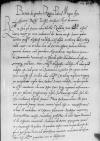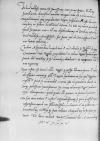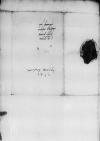Redditae sunt nobis Paternitatis Vestrae ⌊⌋, datae ex arce Lubaviensi die tertia mensis huius, quibus mortem magnifici ⌊Alphonsi Valdesii⌋ ⌊caesareae maiestatis⌋ secretarii dolet certiorque reddi cupit, cui in rebus nostris ad curiam caesaris scribere debeat, queritur demum contra quendam ⌊Alexandrum⌋, impetitorem suum de canonicatu Varmiensi, ac subinde petit libertatem ab officiis muniisque publicis. Mors magnifici ⌊Alphonsi Valdesii⌋ et nobis quidem molesta est, sed cum rerum humanarum is exitus sit, aequiore animo ferre necesse est. Scribit nobis magnificus ⌊Cornelius Duplicius Scepperus⌋ ex ⌊Oeniponte⌋ in written over vi⌈viinin written over vi⌉ vigilia divi Andreae scrinia ⌊Valdesii⌋ necdum perlata esse ⌊Mantuam⌋, ubi tum ⌊caesar⌋ fuit, sicque negotiorum nostrorum, quae per ⌊Fabianum⌋ scripseramus, nihil hactenus agi coeptum esse et vix credimus aliquid futurum. Nam fortunam nostram illic satis iam expertae sumus. Erant ⌊Mantuae⌋ apud ⌊caesarem⌋ ⌊duces Ferrariae, Urbini et Mediolani⌋, ut ⌊caesarem⌋ salutarent. ⌊Pontifex maximus⌋ decima octava mensis Novembris profectus ab urbe ⌊Roma⌋ ⌊Bononiam⌋, ut ibi ⌊caesarem⌋ conveniret, ⌊Andreas ab Auria⌋, expugnata ⌊Corone⌋ in ⌊Peloponneso⌋ et ⌊Patris⌋, et quodam Castro Novo in faucibus freti, quod ex ⌊Iunio Mari⌋ ad ⌊Corinthum⌋ incurrit, revocatur ad vehendam ⌊caesaream maiestatem⌋ proximo vere in ⌊Hispanias⌋.
 BCz, 1601, p. 624
BCz, 1601, p. 624
In locum ⌊Valdesii⌋ nemo est successurus, nam penes ⌊Covos⌋ et illius familiarem domesticum nomine ⌊Draquos⌋ tota est summa rerum Neapolitanarum, quae expedientur lingua Hispanica, et ⌊caesar⌋ decrevit amplius non habere secretarium Latinum. Sic tota vis rerum gerendarum apud ⌊Hispanos⌋ erit et nos desiderabamus, ut ⌊Cornelius⌋ noster in locum ⌊Valdesii⌋ successisset. Haec sunt, quae de curia ⌊caesaris⌋ Paternitatem Vestram non latere voluimus.
Contra ⌊Alexandrum⌋, impetitorem Paternitatis Vestrae, obtulit se reverendus dominus ⌊episcopus Cracoviensis⌋ litteras regias expediturum in urbem ⌊Romam⌋, quibus opus fuerit, dum nuntius sese commodus obtulerit et nos operam nostram non negamus.
Non visum est sacrae ⌊maiestati regiae⌋, quod possit liberam facere Paternitatem Vestram ab officiis muniisque publicis. Quare hortamur, in his, quae regis ac rei publicae sunt, se accommodet, munia ista non gravatim obeat, in hocque potissimum pontificatus sui initio voluntati regiae studeat enixe obtemperare, quod gratiam illi parere in futurum poterit. De his iam antea Paternitati Vestrae respondissemus, si quis fuisset, qui responsum apud nos sollicitasset. Hortamur, ut in posterum servitoribus nuntiisque suis iubeat, ut apud nos responsum petant et bene valeat.



 BCz, 1601, p. 626
BCz, 1601, p. 626